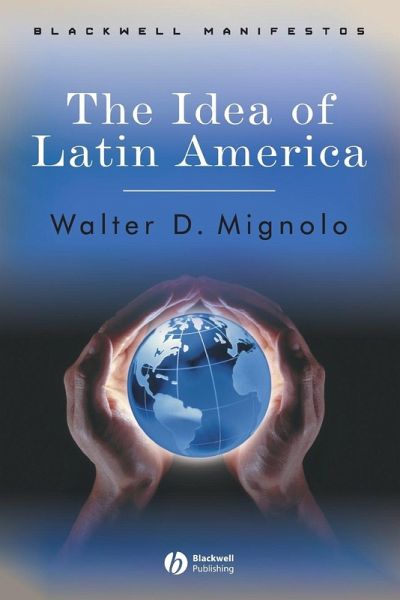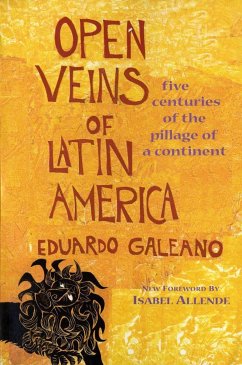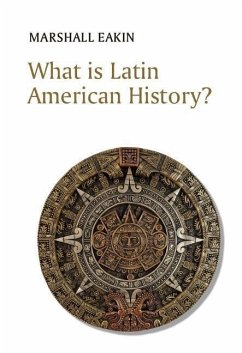
Walter D. Mignolo (Duke University)
Broschiertes Buch
The Idea of Latin America
Versandkostenfrei!
Versandfertig in 2-4 Wochen
Weitere Ausgaben:

PAYBACK Punkte
21 °P sammeln!





A geo-political manifesto which questions the idea of Latinity as a sole name for the South American subcontinent.
Charts the history of the concept of Latinity from its emergence in Europe under France's leadership through to the present day.
Charts the history of the concept of Latinity from its emergence in Europe under France's leadership through to the present day.
Walter D. Mignolo is William H. Wanamaker Professor and Director of Global Studies and the Humanities at the John Hope Franklin Center for International and Interdisciplinary Studies at Duke University. His recent publications include Local Histories / Global Designs: Coloniality, Subaltern Knowledges and Border Thinking (2000) and The Darker Side of the Renaissance: Literacy, Territoriality and Colonization (1995). He is founder and co-editor of the journal, Disposition, and co-founder and co-editor of Nepantla: Views from the South.
Produktdetails
- Wiley-Blackwell Manifestos
- Verlag: Blackwell Publishers
- Seitenzahl: 224
- Erscheinungstermin: 9. November 2005
- Englisch
- Abmessung: 229mm x 152mm x 13mm
- Gewicht: 337g
- ISBN-13: 9781405100861
- ISBN-10: 1405100869
- Artikelnr.: 14788573
Herstellerkennzeichnung
Libri GmbH
Europaallee 1
36244 Bad Hersfeld
gpsr@libri.de
Winner of the 2006 Frantz Fanon Prize for Outstanding Work in or onthe Caribbean Thought in the English Language
"What's in a name? This vigorous, politically engagedessay reveals the 'colonial matrix of power' behind the inventionof the term Latin America. A timely and significant contribution tode-colonial theory and to debates about new social movements in theAmericas." John King, Warwick University
"In this gilded age of hyper-theory, and the next bigparadigm that supersedes the latest, and the anxiety of not havinga paradigm; in this age of theory hyper-inflation, and the furorover the latest missive from the "great masters," it ismentally refreshing to read a major work that is not burdened byobsequiousness toward
"What's in a name? This vigorous, politically engagedessay reveals the 'colonial matrix of power' behind the inventionof the term Latin America. A timely and significant contribution tode-colonial theory and to debates about new social movements in theAmericas." John King, Warwick University
"In this gilded age of hyper-theory, and the next bigparadigm that supersedes the latest, and the anxiety of not havinga paradigm; in this age of theory hyper-inflation, and the furorover the latest missive from the "great masters," it ismentally refreshing to read a major work that is not burdened byobsequiousness toward
Mehr anzeigen
the intellectual fashions of the EuroAmericandominated market place of ideas, and that without great fanfaremanages to turn on their head all our assumptions about our placeon the map of history and reason. Walter Mignolo's TheIdea of Latin America has elegantly achieved what greatmanifestos generally accomplish. It has announced the obsolescenceof entrenched ways of thinking; it has given us new conceptual andhistorical narratives; and it has opened up an effaced, ignored,and derogated archive. What is announced in this book is not a newparadigm, but the existence of a type of thinking that has beenproducing new epistemic sites and weaving counter-narratives thatboth challenge the claim to universality of EuroAmerican theorizingand that nonetheless explain its origins, political economy,resilience and insidiousness. We simply will not be able to see"America" and "Latin America" in the sameway after this book. Brilliantly Mignolo offers this new optics andgeopolitics of knowledge by rejecting theepistemic-historical-onto-theological blackmail imposed byEuroAmerican hyper-theory: either Orientalism or Occidentalism.Beyond this imperial Manicheanism of the new, latest, improvedEuro-American paradigm, beyond either you are for us(Eurocentrism), or you are against us (Thirdworldism), there is away of thinking that looks at the geography of reasontransversally, across and sideways, and not in terms of time-tablesand invidious hierarchies, which allows to think many worldsco-existing in empathic solidarity. On the shelf of those works onethinks with in order to think beyond, where one finds the books ofFanon, Said, C.R. L. James, Shiva, and Retamar, one will now haveto put those of Walter Mignolo." Eduardo Mendieta, StonyBrook University
Schließen
Für dieses Produkt wurde noch keine Bewertung abgegeben. Wir würden uns sehr freuen, wenn du die erste Bewertung schreibst!
Eine Bewertung schreiben
Eine Bewertung schreiben
Andere Kunden interessierten sich für











